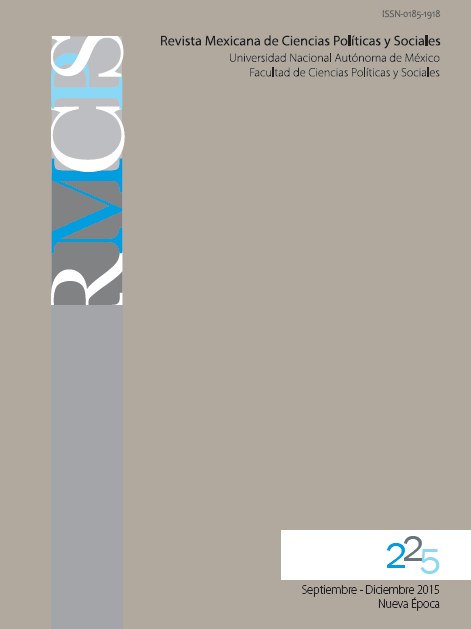Urban Poverty, Local Community and State-Partner in Argentina: The Provision of Public Services in a Shanty Town in the Metropolitan Region of Buenos Aires
Main Article Content
Abstract
Downloads
Article Details
Citas en Dimensions Service
References
Auyero, Javier, (2001) La política de los pobres: las prácticas clientelistas del peronismo. Buenos Aires, Editorial Manantial.
Azpiazu, Daniel, (2010) “Privatización del agua y el saneamiento en Argentina: el caso paradigmático de Aguas Argentinas, S.A.” en Vértigo - la revue électronique en sciences de l’environnement. Hors série 7, pp. 1-11. Montreal y Québec, Erudit. Disponible en: <http://www.erudit.org/revue/vertigo/2010/v/nvertigo3897/044527ar.pdf> [Consultado el 14 de enero de 2015].
Barrientos, Alejandro y Claudio Santibáñez, (2009) “New Forms of Social Assistance and the Evolution of Social Protection in Latin America” en Journal of Latin American Studies. Vol. 41, núm. 1, pp. 1-26. Cambridge, Cambridge University Press.
Ciccolella, Pablo e Ignacio Mignaqui, (2004) “Economía global y reestructuración metropolitana. Buenos Aires: ¿Ciudad global o ciudad dual del siglo XXI?” en Cuenya, Beatriz, Fidel, Carlos e Hilda Herzer (coords.), Fragmentos sociales. Problemas urbanos de la Argentina. Buenos Aires, Siglo XXI Editores, pp. 28- 62.
Collier, Ruth y Samuel Handlin, (2009) “Situating the Analysis: Analytic Approach, Cases, and Historical Context” en Collier, Ruth y Samuel Handlin (eds.), Reorganizing Popular Politics: Participation and the New Interest Regime in Latin America. Pennsylvania, The Pennsylvania State University Press, pp. 32-60.
Cravino, María Cristina, Del Río, Juan y Juan Duarte, (2007) Magnitud y crecimiento de las villas y asentamientos en el Área Metropolitana de Buenos Aires en los últimos 25 años. Buenos Aires, Universidad Nacional de General Sarmiento.
Dean, Mitchell, (1999) Governmentality: Power and Rule in Modern Society. Londres, SAGE Publications.
Harvey, David, (2008) “The Right to the City” en New Left Review. Vol. 53, pp. 23-39. Londres, NLR.
Holton, Judith y Barney Glaser, (2012) The Grounded Theory Review Methodology Reader: Selected Papers 2004-2011. Mill Valley, CA, Sociology Press.
Holston, James, (2008) Insurgent Citizenship: Disjunctions of Democracy and Modernity in Brazil. Princeton y Oxford, Princeton University Press.
Holston, James, (2009) “La ciudadanía insurgente en una era de periferias urbanas globales: un estudio sobre la innovación democrática, la violencia y la justicia social” en Delamata, Gabriela (ed.), Movilizaciones sociales: ¿nuevas ciudadanías? Reclamos, derechos, Estado en Argentina, Bolivia y Brasil. Buenos Aires, Biblos, pp. 46-65.
Lefebvre, Henry, (1968) Le Droit à la ville. París, Anthropos.
McFarlane, Collin, (2012) “The Entrepreneurial Slum: Civil Society, Mobility, and the Co-production of Urban Development” en Urban Studies. Vol. 49, núm. 1, pp. 2926-2947. Thousand Oaks, SAGE.
Ministerio de Desarrollo Social, (2009) “Resolución Número 3182” en Desarrollo Social. Disponible en: <http://www.desarrollosocial.gob.ar/Uploads/i1/ArgentinaTrabaja/Resolucion_3182_2009.pdf> [Consultado por última vez el 15 de enero de 2015].
Osborne, Thomas y Nikolas Rose, (1999) “Governing Cities: Notes on the Spatialisation of Virtue” en Society and Space, Environmental and Planning. Vol. 17, pp. 737-760. Londres, Pion LTD.
Pírez, Pedro, (2004) “La configuración metropolitana de Buenos Aires: expansión, privatización y fragmentación” en Realidad Económica. Vol. 208, pp. 16-25. Buenos Aires, IADE.
Pírez, Pedro, (2008) “La privatización de la expansión metropolitana en Buenos Aires” en Pírez, Pedro (ed.), Buenos Aires, la formación del presente. Quito, OLACHI, pp. 285-304.
Pushpa, Arabindoo, (2012) “Rethoric of the ‘Slum”’ en City: Analysis of Urban Trends, Culture, Theory, Policy, Action. Vol. 15, núm. 6, pp. 636- 646. Nueva York, Taylor & Francis.
Red GESOL, (2013) “Nuestra historia” en Red GESOL. Disponible en: <http://www.gesol.org.ar/n_historia.htm> [Consultado el 14 de enero de 2015].
Rose, Nikolas, O’Malley, Pat y Mariana Valverde, (2006) “Governmentality” en Law & Society, Annual Review. Vol. 2, núm. 83, pp. 83-104. Nueva Jersey, Wiley.

La Revista Mexicana de Ciencias Políticas y Sociales publicada por la Universidad Nacional Autónoma de México se distribuye bajo una Licencia Creative Commons Atribución-NoComercial-SinDerivar 4.0 Internacional.
Basada en una obra en http://www.revistas.unam.mx/index.php/rmcpys/
La RMCPyS autoriza a sus colaboradores que suban una copia de sus trabajos publicados en sus webs personales o en cualquier repositorio de acceso abierto, siempre y cuando se mencione específicamente a la Revista Mexicana de Ciencias Políticas y Sociales como fuente original de procedencia, citando el año y número del ejemplar respectivo y añadiendo el enlace a la página web donde este órgano editorial puede ser consultado in toto, de manera abierta y gratuita en: <www.revistas.unam.mx/index.php/rmcpys>.
Las y los lectores tienen libertad para:
Compartir, copiar y redistribuir el material en cualquier medio o formato.
El licenciante no puede revocar estas libertades en tanto usted siga los términos de la licencia.
De acuerdo con los siguientes términos:
- Atribución: la/el lector/a debe reconocer el crédito de una obra de manera adecuada, proporcionar un enlace a la licencia, e indicar si se han realizado cambios. Puede hacerlo en cualquier forma razonable, pero no de forma tal que sugiera que tiene el apoyo del licenciante o lo recibe por el uso que hace.
- No comercial: la/el lector/a no puede hacer uso del material con fines comerciales.
- Si se mezcla, transforma o se desarrolla a partir de la obra licenciada, no se permite la distribución del material modificado.
Cargos por gestión de artículos
La Revista Mexicana de Ciencias Políticas y Sociales NO cobra tarifas por recibir, procesar o publicar los artículos (Article Processing Charge [APC]) enviados por los autores.





